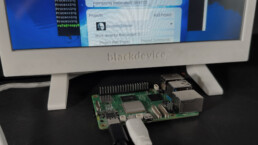Contribute to science with your Raspberry Pi and BOINC
Did you know that your Raspberry Pi can play a role in cutting-edge scientific research in fields like biology, astrophysics, mathematics, and medicine? Thanks to BOINC (Berkeley Open Infrastructure for Network Computing), you can share your Pi’s computing power with researchers worldwide—helping analyze massive datasets and accelerate scientific discovery.
BOINC is a distributed computing platform with more than 100.000 connected computers globally. By pooling resources, it creates an enormous network of computing power that scientists can use for complex calculations. If you’ve been around the tech scene for a while, you might even remember SETI@home, one of the pioneering projects searching for extraterrestrial signals.
In this tutorial, we’ll show you how to install BOINC on a Raspberry Pi 5 and join one of the many projects that support it. It’s easier than you think, and in just a few steps, you’ll be contributing to real scientific research.
What You’ll Need
Before we begin, here’s the list of components required for this project:
- Raspberry Pi (we’re using the Raspberry Pi 5 with 8GB RAM)
- MicroSD card and card reader
- USB keyboard and mouse
- HDMI monitor
Step 1: Prepare Raspberry Pi OS
First, flash the latest 64-bit Raspberry Pi OS onto a microSD card using the Raspberry Pi Imager desktop app.
Insert the card into your Raspberry Pi, connect a USB keyboard, an HDMI monitor, and power it up.
Once Raspberry Pi OS boots, make sure your Pi is connected to your local Wi-Fi. Open a terminal (or connect via SSH) and update the system:
sudo apt update
Step 2: Install BOINC
Install the BOINC client with:
sudo apt install boinc
You’ll now find BOINC in your applications menu.
Step 3: Join a Project
Launch BOINC and explore the available scientific projects. You can find the full list on the BOINC website. Look for projects with the Raspberry Pi icon to ensure compatibility.
As an example, let’s join Einstein@Home—a project that analyzes vast amounts of data from observatories like Arecibo, LIGO, and Fermi to search for pulsars. Simply create an account on their site, log in through the BOINC app, and your Raspberry Pi will begin contributing to their research.
Whenever your Pi isn’t busy with other tasks, BOINC will use its idle processing power to help crunch scientific data.
 Ready to Contribute?
Ready to Contribute?
That’s it—you’re now part of a global effort to advance science. Explore the full list of projects, choose one that inspires you, and let your Raspberry Pi make a difference.


